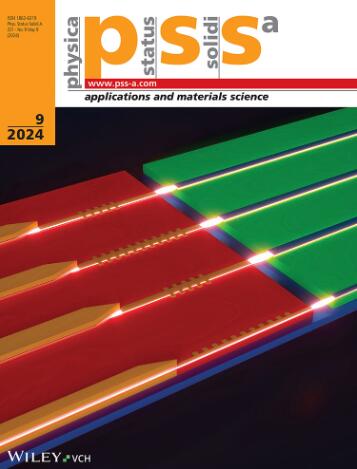在前哨节点活检中使用超顺磁性氧化铁粒子--评估其对乳腺磁共振成像、全视野数字乳腺 X 射线照相术和对比增强型乳腺 X 射线照相术的影响
IF 1.9
4区 材料科学
Q3 MATERIALS SCIENCE, MULTIDISCIPLINARY
Physica Status Solidi A-applications and Materials Science
Pub Date : 2024-07-24
DOI:10.1002/pssa.202400370
引用次数: 0
摘要
乳腺癌患者在手术切除实体瘤时,大多会同时切除前哨淋巴结,因为这是肿瘤细胞转移的第一个部位。为了识别前哨淋巴结,可以使用超顺磁性氧化铁(SPIO)粒子,这种方法与传统的放射性同位素示踪法相比有许多优点。然而,SPIO 粒子的一个缺点是会在乳腺磁共振成像(MRI)中产生伪影。在之前的一项研究中,我们研究了将这些粒子的剂量从 2 毫升降低到 1 毫升是否能避免这些伪影的出现。在对 14 名患者进行的研究中,放射科医生在全视野数字乳腺 X 射线照相术和对比增强乳腺 X 射线照相术图像上未观察到任何伪影,而在乳腺核磁共振成像图像上则相反,所有图像上都能观察到伪影。因此,将 SPIO 粒子的剂量从 2 毫升降低到 1 毫升并不会改变乳腺核磁共振成像的结果。在本文中,我们将根据这些结果,从数学和物理的角度讨论这些伪影的起源。本文章由计算机程序翻译,如有差异,请以英文原文为准。
Use of Superparamagnetic Iron Oxide Particles in Sentinel Node Biopsy—Evaluation of Its Effects on Breast MRI, Full‐Field Digital Mammography, and Contrast‐Enhanced Mammography
Upon surgical removal of solid tumors in patients with breast cancer, the sentinel lymph nodes are mostly concomitantly removed as this is the first site to which tumor cells metastasize. To identify the sentinel lymph nodes, superparamagnetic iron oxide (SPIO) particles can be employed, a method that has several advantages over the classical tracer with radioisotopes. However, one downside of SPIO particles is the formation of artifacts on magnetic resonance imaging (MRI) of the breast. In a previous study, we investigated if lowering the dose of these particles from 2 to 1 mL would prevent the occurrence of these artifacts. In a study of 14 patients, radiologists do not observe any artifacts on the full‐field digital mammography and contrast‐enhanced mammography images, contrary to breast MRI images, in which case artifacts are observed on all images. Hence, lowering the dose from 2 to 1 mL SPIO particles did not change the outcome of the breast MRI images. In this article, based on these results, we discuss the origins of these artifacts from a mathematical and physical point of view.
求助全文
通过发布文献求助,成功后即可免费获取论文全文。
去求助
来源期刊
CiteScore
3.70
自引率
5.00%
发文量
393
审稿时长
2 months
期刊介绍:
The physica status solidi (pss) journal group is devoted to the thorough peer review and the rapid publication of new and important results in all fields of solid state and materials physics, from basic science to applications and devices. Among the largest and most established international publications, the pss journals publish reviews, letters and original articles, as regular content as well as in special issues and topical sections.

 求助内容:
求助内容: 应助结果提醒方式:
应助结果提醒方式:


